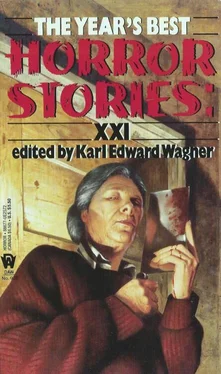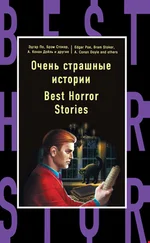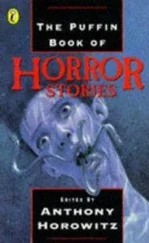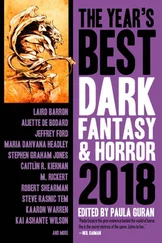It was as if he’d released her by relinquishing his image of her and going to the window. He felt as though he was on the brink of realizing the extent of his secret power. Suppose there really was something to this sex magic? Suppose he had made her experience at least some of his fantasies? He couldn’t believe he had reached her physically, but what would it be like for her to have her thoughts invaded by his fantasies about her? He had to know the truth, though he didn’t know what he would do with it. He grabbed his coat and ran downstairs, into the fog.
Once on the pavement he stood still and held his breath. He heard his heartbeat, the cackling of ducks, the girl’s heels running away from him. He advanced into the fog, trying to ensure that she didn’t hear him. The bookshop window drifted by, crowded with posed figures and their victims. Ahead of him the fog parted for a moment, and the girl looked back as if she’d sensed his gaze closing around her. She saw him illuminated harshly by the fluorescent tube in the bookshop window, and at once she ran for her life.
“Don’t run away,” Sid called. “I won’t hurt you, I only want to talk to you.” Surely any other thoughts that were lurking in his mind were only words. It occurred to him that he had never heard her speak. In that case, whose sobs had he heard in his fantasies? There wasn’t time for him to wonder now. She had vanished into the fog, but a change in the sound of her footsteps told him where she had taken refuge: in the park.
He ran to the nearest entrance, the one she would have used, and peered along the path. Thickly swirling rays of light from a streetlamp splayed through the railings and stubbed themselves against the fog. He held his breath, which tasted like a head cold, and heard her gravelly footsteps fleeing along the path. “We’ll have to meet sooner or later, love,” he called, and ran into the park.
Trees gleamed dully, wet black pillars upholding the fog. The grass on either side of the path looked weighed down by the slow passage of the murk which Sid seemed to be following. Once he heard a cry and a loud splash—a bird landing on the lake which was somewhere ahead, he supposed. He halted again, but all he could hear was the dripping of branches laden with fog.
“I told you I don’t want to hurt you,” he muttered. “Better wait for me, or I’ll—” The chase was beginning to excite and frustrate and anger him. He left the gravel path and padded across the grass alongside it, straining his ears. When the fog solidified a hundred yards or so to his right, at first he didn’t notice. Belatedly he realized that the dim pale hump was a bridge which led the path over the lake, and was just in time to stop himself from striding into the water.
It wasn’t deep, but the thought that the girl could have made him wet himself enraged him. He glared about, his eyes beginning to sting. “I can see you,” he whispered as if the words would make it true, and then his gaze was drawn from the bridge to the shadows beneath.
At first he wasn’t sure what he was seeing. He seemed to be watching an image developing in the dark water, growing clearer and more undeniable. It had sunk, and now it was rising, floating under the bridge from the opposite side. Its eyes were open, but they looked like the water. Its arms and legs were trailing limply, and so was its blonde hair.
Sid shivered and stared, unable to look away. Had she jumped or fallen? The splash he’d heard a few minutes ago must have been her plunging into the lake, and yet there had been no sounds of her trying to save herself. She must have struck her head on something as she fell. She couldn’t just have lain there willing herself to drown, Sid reassured himself, but if she had, how could anyone blame him? There was nobody to see him except her, and she couldn’t, not with eyes like those she had now. A spasm of horror and guilt set him staggering away from the lake.
The slippery grass almost sent him sprawling more than once. When he skidded onto the path the gravel ground like teeth, and yet he felt insubstantial, at the mercy of the blurred night, unable to control his thoughts. He fled panting through the gateway, willing himself not to slow down until he was safe in his rooms; he had to destroy the photographs before anyone saw them. But fog was gathering in his lungs, and he had a stitch in his side. He stumbled to a halt in front of the bookshop.
The light from the fluorescent tubes seemed to reach for him. He saw his face staring out from among the women bearing whips. If they or anyone else knew what he secretly imagined he’d caused… His buttocks clenched and unclenched at the thought he was struggling not to think. He gripped his knees and bent almost double to rid himself of the pain in his side so that he could catch his breath, and then he saw his face fit over the face of a bound victim.
It was only the stitch that had paralyzed him, he told himself, near to panic. It was only the fog which was making the photograph of the victim appear to stir, to align its position with his. “Please, please,” he said wildly, his voice rising, and at once tried to take the words back. They were echoing in his mind, they wouldn’t stop. He felt as if they were about to unlock a deeper aspect of himself, a power which would overwhelm him.
He didn’t want this, it was contrary to everything he knew about himself. “My name is—” he began, but his pleading thoughts were louder than his voice, almost as loud as the sharp swishing which filled his ears. He was falling forward helplessly, into himself or into the window, wherever the women and pain were waiting. For a moment he managed to cling to the knowledge that the images were nothing but the covers of magazines, and then he realized fully that they were more than that, far more. They were euphemisms for what waited beyond them.
CHINA ROSE
by Ron Weighell
It was the French detective Vidocq, I think, who used to say that every act of evil had its own distinctive odor; that in a crowd of a thousand persons he could tell transgressors of the moral law by the sense of smell alone. What would a man of such singular olfactory accomplishments have made of Nicholas Hallam and Rose Seaford, I wonder? Nothing redolent of brimstone or corruption: rather a subtle whiff of something clinical masked by a sweet incense. And about Rose, of course, always the troubling fragrance of hibiscus.
It began one golden autumn morning in 1923, when I, young, poor and happier than I knew, walked over Parliament Hill Fields to deliver a belated birthday present to my cousin, Diane Harewood. An attack of asthma had prevented me from attending her fancy-dress party the night before, robbing me of the chance to appear as a swashbuckling pirate. The Theda Baras and Nell Gwynns would never know what they had missed. I remember worrying as I rang the bell in case I woke Diane, which shows how little I knew then of her riotous life style. Coming from the poorer side of the family, I had no experience of life among the Hampstead set. So I was surprised to find the door answered by Napoleon Bonaparte, who let me into a scene of chaos.
It appeared that some colossus had lifted the lid off the house and buried the floor under a ton of streamers, balloons and unconscious bodies. The air was thick with cigarette smoke and the fumes of alcohol, the lounge curtains still drawn, so all was seen in an unearthly half-light. The clouds of noxious smoke and the notorious historical figures lying around in postures of pain and despair made it all a bit like Hades, but at the far end of the room a Lalique lamp cast a golden glow across armchairs drawn up around a coffee table laden with empty bottles. There sat Diane, transformed by white silk pajamas, bathing cap and greasepaint into a fetchingly malevolent Pierrot. She was deep in conversation with a 90s dandy in the Des Esseintes style.
Читать дальше












